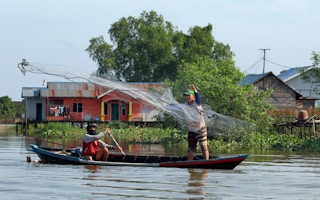Fishers are taking advantage of a perceived drop in enforcement amid the Covid-19 crisis to operate illegally in Indonesian waters, officials say.
Indonesia has since November 2014 banned foreign fishing boats from operating in its waters, home to some of the world’s richest fish stocks. Indonesian fisheries law also bans destructive fishing methods, including the use of explosives and cyanide. But travel bans and other restrictions imposed in response to the novel coronavirus pandemic appear to have encouraged some fishers to try their luck.
“In conditions like these, destructive fishing practices are potentially increasing, and this must remain a concern for all authorities and regional governments,” Haeru Rahayu, the director-general of marine and fisheries resources at the Indonesian fisheries ministry, told Mongabay.
Authorities have seized at least 19 foreign fishing boats since March 1, a day before the country reported its first confirmed Covid-19 cases. These boats bore the flags of Vietnam, Malaysia and the Philippines, and were caught in separate incidents off North Natuna, in the Sulawesi Sea, and in the Malacca Strait. At the same time the government has also reported a growing number of cases of destructive fishing by local fishers across the archipelago.
Haeru said his team had anticipated the “uptick in illegal fishing by foreign boats” trying to operate under the impression that the Covid-19 measures would result in less maritime vigilance by Indonesian authorities.
“
Generally, economic crime which is an organised action always looks for that moment when monitoring by state authorities is weak or absent.
Mas Achmad Santosa, executive director, Indonesia Ocean Justice Initiative
“Amid the Covid-19 pandemic, the fisheries ministry is absolutely not relaxing its operations to protect the sovereignty of fisheries management in the Republic of Indonesia,” he said. “Our monitoring fleets are staying ready in sites that are prone to illegal fishing.”
Indonesia’s former fisheries minister, Susi Pudjiastuti, who enacted the ban on foreign fishing, gained widespread popularity for a policy of seizing these vessels and later sinking them to create deterrent effect and prevent their possible reuse for illegal fishing. The policy, though controversial with some of the flag countries of the capsized vessels, was praised by experts and the public at home and abroad, and was considered to have helped replenish fish stocks in Indonesian waters.
But law enforcement at sea remains a key challenge for the Southeast Asian nation, whose more than 17,000 islands and third-longest coastline in the world makes it difficult to detect illegal and destructive fishers seizing on blind spots in monitoring. The incumbent fisheries minister, Edhy Prabowo, has also been criticised by experts for considering a plan to end the sinking of seized illegal boats.
Marine observers have called on the government to beef up efforts to guard the country’s waters and fisheries resources from illegal and destructive practices amid the coronavirus crisis. Indonesia has recorded 10,118 infections and 792 deaths from Covid-19 as of April 30.
“Generally, economic crime which is an organised action always looks for that moment when monitoring by state authorities is weak or absent,” Mas Achmad Santosa, a former coordinator of Indonesia’s anti-illegal fishing task force and current executive director of the think tank Indonesia Ocean Justice Initiative, told Mongabay.
Santosa urged the fisheries ministry to maintain or, if possible, increase monitoring days by the coast guard from the current 150 days per year, and optimise the use of satellite tracking systems for vessel monitoring, such as AIS and VMS.
“It is very possible that the budget for maritime monitoring is reduced because the priority is now focused on combating Covid-19,” Santosa said. “But I appreciate the fisheries ministry which has seized 19 foreign boats amid the Covid-19 pandemic. It shows that monitoring isn’t relaxed.”
The fisheries ministry reported on April 22 that its budget for this year has been slashed by 1.8 trillion rupiah ($119 million), or more than a quarter, to provide funding for tackling the Covid-19 outbreak in the country. Among the affected programs is a stimulus package to prop up fish sales and provide fishers with financial aid as the health crisis hits seafood sales and demand; the stimulus has been cut by 17 per cent to 362 billion rupiah ($24 million). Indonesia’s total budget for the coronavirus crisis is nearly $27 billion.
Activists say the government must prioritise the social safety net for the 8 million households that depend on fishing for a livelihood. They’ve called for, among other things, funds to be reallocated from the 9.93 trillion rupiah ($657 million) budget for local elections this year.
“The government must allocate special funds for fishing households whose incomes have dropped due to the Covid-19 outbreak,” said Susan Herawati, the secretary general of the local NGO People’s Coalition for Fisheries Justice (KIARA).
This story was published with permission from Mongabay.com.










